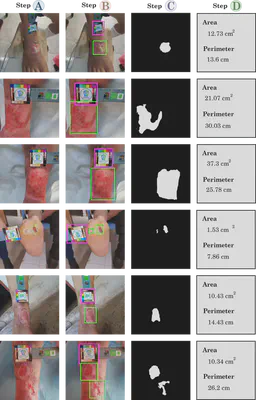Automated Chronic Wounds Medical Assessment and Tracking Framework Based on Deep Learning
Automated Chronic Wounds Medical Assessment and Tracking Framework Based on Deep Learning
Oct 1, 2023·

 ,,,,,,
,,,,,, ,,
,,
Brayan Monroy
Karen Sanchez
Paula Arguello
Juan Estupiñan
Jorge Bacca
Claudia v. Correa
Laura Valencia
Juan C. Castillo
Olinto Mieles
Henry Arguello
Sergio Castillo
Fernando Rojas-Morales
Abstract
Chronic wounds are a latent health problem worldwide, due to high incidence of diseases such as diabetes and Hansen. Typically, wound evolution is tracked by medical staff through visual inspection, which becomes problematic for patients in rural areas with poor transportation and medical infrastructure. Alternatively, the design of software platforms for medical imaging applications has been increasingly prioritized. This work presents a framework for chronic wound tracking based on deep learning, which works on RGB images captured with smartphones, avoiding bulky and complicated acquisition setups. The framework integrates mainstream algorithms for medical image processing, including wound detection, segmentation, as well as quantitative analysis of area and perimeter. Additionally, a new chronic wounds dataset from leprosy patients is provided to the scientific community. Conducted experiments demonstrate the validity and accuracy of the proposed framework, with up to 84.5% in precision.
Type
Publication
Elsevier: Computers in Biology and Medicine
Proposed Method

Qualitative results
